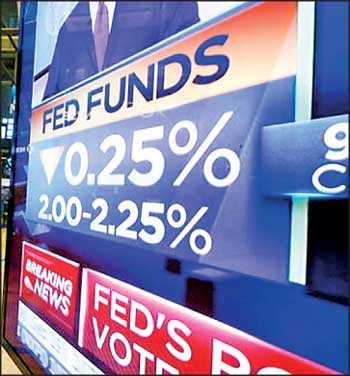Monday Feb 16, 2026
Monday Feb 16, 2026
Saturday, 30 May 2020 00:00 - - {{hitsCtrl.values.hits}}
 LONDON (Reuters): Global stock markets fell and safe havens such as bonds and the Japanese yen gained yesterday, as investors awaited Washington’s response to China tightening control over the city of Hong Kong.
LONDON (Reuters): Global stock markets fell and safe havens such as bonds and the Japanese yen gained yesterday, as investors awaited Washington’s response to China tightening control over the city of Hong Kong.
China’s Parliament on Thursday pressed ahead with national security legislation for the city, raising fears over the future of its freedoms and its function as a finance hub.
US President Donald Trump said he would hold a news conference on China later yesterday. Trepidation about a further deterioration in Sino-US relations put investors on edge.
European stocks sank, with the pan-European STOXX 600 index down 0.83% by midday in London. Germany’s DAX fell 1%, Britain’s FTSE 100 by 1% and France’s CAC 40 by 0.65%. Futures for the S&P 500 slipped 0.3%.
MSCI’s broadest index of Asia-Pacific shares outside Japan was flat. Japan’s Nikkei retreated from a three-month high and the yen rose to a two-week high of 107.06 against the dollar. Bonds rose.
“The question is how far Trump will go at today’s press conference, as removing Hong Kong’s favoured status would probably spark negative market developments, hitting global risk sentiment, which could backfire on the US economy as it would further deteriorate the relationship with China,” strategists at Danske Bank said in a note to clients.
Trump offered a muted response to Hong Kong’s mass democracy protests last year while pursuing a trade deal with China. But ties with Beijing have since soured considerably through the COVID-19 pandemic.
Hong Kong’s Government warned yesterday that withdrawing its special US status, which has underpinned it as a finance hub, could be a “double-edged sword” and urged the US to stop interfering in its internal affairs.
The Chinese yuan weakened in offshore trade.
Hong Kong’s Hang Seng index was 0.8% lower and has lost about 3% in the two weeks since news of China’s security legislation broke.
In bond markets, yields on benchmark 10-year US Treasuries fell to 0.6705%, more than 100 basis points below where they began 2020.
Despite the gathering tension and the near-daily release of grim economic data, enormous global stimulus seems to have propped up stocks. The S&P 500 is up 4% for the month and on track for its best May since 2009.
A rally in the risk-sensitive Aussie dollar is slowing, but the currency has gained nearly 2% for the month and sits 20% above March lows.
MSCI’s All Country World Index, which tracks stocks across 49 countries, is on track for a 3.5% gain this week – its best weekly performance since April. The index was down 0.1% on the day.
The optimism stems from signs of progress in the world economy. The number of Americans seeking jobless benefits fell for an eighth straight week last week and New York has outlined plans for reopening.
“As we have said about the reopening and ensuing recovery, this is a process,” said RBC Capital Markets’ chief US economist Tom Porcelli. “And right now the process is moving along in the right direction.”
The euro was headed for its best month since December as the European Union’s 750 billion-euro coronavirus recovery fund fuelled optimism about the EU’s political future. It hit a two-month high of $ 1.1114 and last traded at $ 1.1106.
The dollar sank against a basket of currencies, down 0.4%.
Gold rose 0.5% to trade at $ 1,727.32 an ounce.
In oil, Brent crude fell 2.78% to $ 34.31 a barrel. US crude fell 3.3% to $ 32.59 a barrel.
Both contracts are headed for their biggest monthly gains in years as production cuts and optimism about demand recovery led by China supported prices.
London aluminium prices, which stayed flat yesterday, were set for their strongest monthly gain since January 2019, underpinned by a solid recovery in demand from top consumer China.